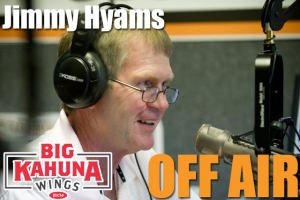
By Jimmy Hyams
No one would argue that a plethora of injuries had a negative impact on Tennessee’s defense last year.
The question is: How big of an impact?
Are injuries the lone reason Tennessee’s defense allowed 36.8 points per game in SEC play? Or 740 yards to Missouri? Or 37 plays of 30 or more yards?
Probably not.
Tennessee had seven defenders who started at least nine games: Todd Kelly Jr., Micah Abernathy, Rashaan Gaulden, Emmanuel Moseley, Kendal Vickers, Derek Barnett and Corey Vereen.
Four others started at least seven games: Darrin Kirkland Jr., Cam Sutton, Colton Jumper, Malik Foreman.
By the same token, the secondary used 11 different combinations in 13 games (although some changes were due to poor play, not injuries) and the defensive tackle spot was decimated by injuries (Shy Tuttle, Kahlil McKenzie), and a suspension (Danny O’Brien).
“Injuries took their toll,’’ said Tennessee defensive coordinator Bob Shoop, “and at the end of the year, we certainly didn’t play consistently enough to our style of play.’’
Shoop was asked if injuries hit the team hardest physically, mentally or from a leadership standpoint.
“All of the above, probably,’’ Shoop said.
Two of three defensive players drafted from Tennessee missed significant playing time: cornerback Cam Sutton (he missed six games) and linebacker Jalen Reeves-Maybin (who missed eight; he was ejected from one and was hurt in another).
Shoop said injuries led to a lack of “continuity,’’ and that “from one week to the next, you weren’t 100 percent sure who was playing.’’
By the end of the season, Shoop said, the defense was gassed. He pointed to a 49-36 win over Kentucky and a 63-37 victory over Missouri (in which the defense played 110 snaps).
“I thought those two games took everything we had out of us,’’ Shoop said.
But the game that bothered Shoop the most was the 45-34 loss to instate rival Vanderbilt, Shoop’s former team. Tennessee led 21-7 before collapsing. The defense allowed Vandy quarterback Kyle Shurmur, who was averaging 166 passing yards per game, to throw for 416.
“The game that I would want back would be the Vanderbilt game,’’ Shoop said. “I thought from the middle of the second quarter to end of the game, it looked like we were playing with ankle weights on. That’s really the one game I knew we’d run out of gas. We looked bad and it wasn’t our style of play. I was discouraged after that game. I think we all were.’’
Discouraged because it cost Tennessee its first trip to the Sugar Bowl since 1990.
Discouraged because you lost to a Vanderbilt team that was below .500 at kickoff.
Discouraged because you couldn’t slow down a Vandy offense that had scored six points against Florida, seven against Georgia Tech, 10 against South Carolina, 13 against Kentucky and 17 against Missouri.
To support Shoop’s supposition about the defense being tired, after the Vols took off 10 days before bowl practice, the unit came back refreshed.
“This isn’t the same team,’’ Shoop said of the pre-bowl practices. “You could see when we were practicing for Nebraska, we were practicing better, we were fresher, we looked like a big-league defense again. I really didn’t have much doubt in my head we’d go out and play pretty good against Nebraska.’’
Tennessee won 38-24, holding Nebraska to 318 total yards, 61 rushing yards (42 on one run) and 2.2 yards per run (compared to 5.1 during the regular season).
Shoop said the defense wasn’t a total disaster: “We played well enough to win nine games, so we did something right.’’
But he was alarmed at the big plays surrendered. UT allowed five plays of 70 or more yards, four of them on runs. Shoop called those “catastrophic’’ plays.
“We’ve got to minimize those plays,’’ Shoop said. “We’ve got to run to the ball better, we’ve got to beat blocks, we’ve got to tackle better and we’ve got to play better fundamental football.
“I don’t think it was any Xs or Os or schemes. … No defense can statistically overcome 60 and 70 yard runs. It’s hard to do.’’
Big Kahuna Wings: The wings that changed it all














